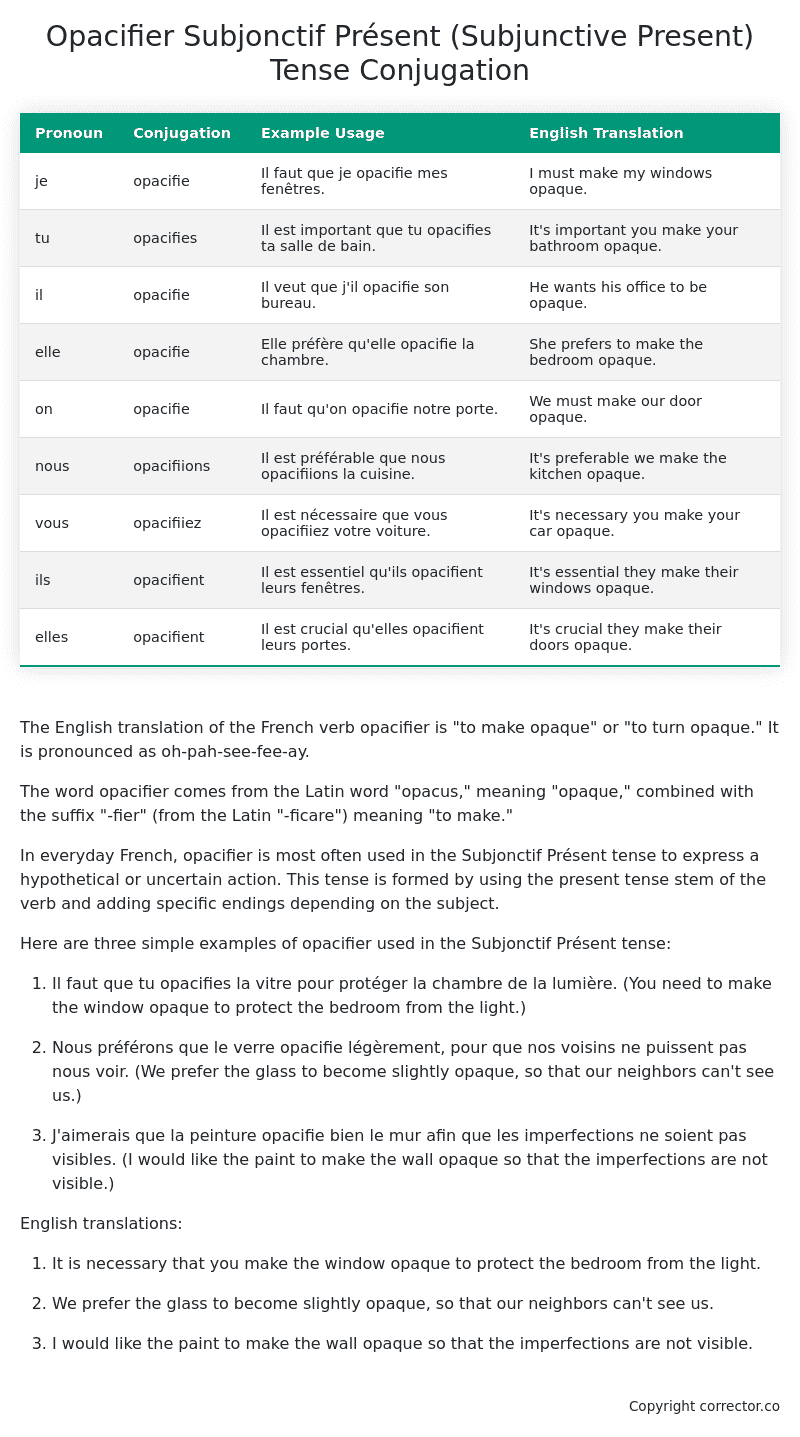Subjonctif Présent (Subjunctive Present) Tense Conjugation of the French Verb opacifier
Introduction to the verb opacifier
The English translation of the French verb opacifier is “to make opaque” or “to turn opaque.” It is pronounced as oh-pah-see-fee-ay.
The word opacifier comes from the Latin word “opacus,” meaning “opaque,” combined with the suffix “-fier” (from the Latin “-ficare”) meaning “to make.”
In everyday French, opacifier is most often used in the Subjonctif Présent tense to express a hypothetical or uncertain action. This tense is formed by using the present tense stem of the verb and adding specific endings depending on the subject.
Here are three simple examples of opacifier used in the Subjonctif Présent tense:
-
Il faut que tu opacifies la vitre pour protéger la chambre de la lumière. (You need to make the window opaque to protect the bedroom from the light.)
-
Nous préférons que le verre opacifie légèrement, pour que nos voisins ne puissent pas nous voir. (We prefer the glass to become slightly opaque, so that our neighbors can’t see us.)
-
J’aimerais que la peinture opacifie bien le mur afin que les imperfections ne soient pas visibles. (I would like the paint to make the wall opaque so that the imperfections are not visible.)
English translations:
-
It is necessary that you make the window opaque to protect the bedroom from the light.
-
We prefer the glass to become slightly opaque, so that our neighbors can’t see us.
-
I would like the paint to make the wall opaque so that the imperfections are not visible.
Table of the Subjonctif Présent (Subjunctive Present) Tense Conjugation of opacifier
| Pronoun | Conjugation | Example Usage | English Translation |
|---|---|---|---|
| je | opacifie | Il faut que je opacifie mes fenêtres. | I must make my windows opaque. |
| tu | opacifies | Il est important que tu opacifies ta salle de bain. | It’s important you make your bathroom opaque. |
| il | opacifie | Il veut que j’il opacifie son bureau. | He wants his office to be opaque. |
| elle | opacifie | Elle préfère qu’elle opacifie la chambre. | She prefers to make the bedroom opaque. |
| on | opacifie | Il faut qu’on opacifie notre porte. | We must make our door opaque. |
| nous | opacifiions | Il est préférable que nous opacifiions la cuisine. | It’s preferable we make the kitchen opaque. |
| vous | opacifiiez | Il est nécessaire que vous opacifiiez votre voiture. | It’s necessary you make your car opaque. |
| ils | opacifient | Il est essentiel qu’ils opacifient leurs fenêtres. | It’s essential they make their windows opaque. |
| elles | opacifient | Il est crucial qu’elles opacifient leurs portes. | It’s crucial they make their doors opaque. |
Other Conjugations for Opacifier.
Le Present (Present Tense) Conjugation of the French Verb opacifier
Imparfait (Imperfect) Tense Conjugation of the French Verb opacifier
Passé Simple (Simple Past) Tense Conjugation of the French Verb opacifier
Passé Composé (Present Perfect) Tense Conjugation of the French Verb opacifier
Futur Simple (Simple Future) Tense Conjugation of the French Verb opacifier
Futur Proche (Near Future) Tense Conjugation of the French Verb opacifier
Plus-que-parfait (Pluperfect) Tense Conjugation of the French Verb opacifier
Passé Antérieur (Past Anterior) Tense Conjugation of the French Verb opacifier
Futur Antérieur (Future Anterior) Tense Conjugation of the French Verb opacifier
Subjonctif Présent (Subjunctive Present) Tense Conjugation of the French Verb opacifier (this article)
Subjonctif Passé (Subjunctive Past) Tense Conjugation of the French Verb opacifier
Subjonctif Imparfait (Subjunctive Imperfect) Tense Conjugation of the French Verb opacifier
Subjonctif Plus-que-parfait (Subjunctive Pluperfect) Tense Conjugation of the French Verb opacifier
Conditionnel Présent (Conditional Present) Tense Conjugation of the French Verb opacifier
Conditionnel Passé (Conditional Past) Tense Conjugation of the French Verb opacifier
L’impératif Présent (Imperative Present) Tense Conjugation of the French Verb opacifier
L’infinitif Présent (Infinitive Present) Tense Conjugation of the French Verb opacifier
Struggling with French verbs or the language in general? Why not use our free French Grammar Checker – no registration required!
Get a FREE Download Study Sheet of this Conjugation 🔥
Simply right click the image below, click “save image” and get your free reference for the opacifier Subjonctif Présent tense conjugation!

Opacifier – About the French Subjonctif Présent (Subjunctive Present) Tense
Formation of the Subjonctif Présent
Common Everyday Usage Patterns
Interactions with Other Tenses
Summary
I hope you enjoyed this article on the verb opacifier. Still in a learning mood? Check out another TOTALLY random French verb conjugation!


